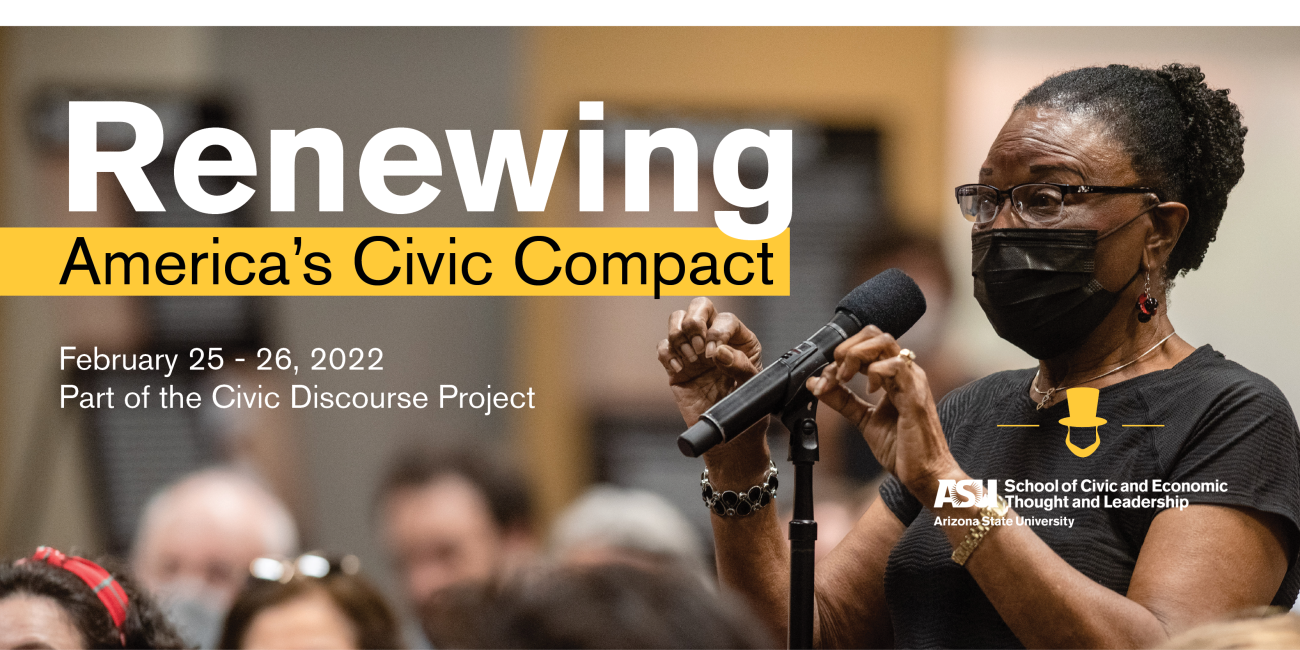Event Schedule
The theme of the 2021-2022 season of the School of Civic and Economic Thought and Leadership’s Civic Discourse Project is “Renewing America’s Civic Compact.” The challenge of our current time is to find a path on which Americans can move together with a sense of purpose to rebuild the public and private institutions through which we sustain our civic, communal, and professional lives.
Americans must find a way to engage civilly amidst competing perspectives in the face of the many trials we face in politics and governance, at home and abroad.
The goal of the series is to offer a serious assessment of what the challenges are to American civic life and its institutions—including the university—and to discuss how to rebuild the institutions and unity of our civil society.
At a glance.
What: Spring 2022 Conference: Renewing America's Civic Compact
Where: Memorial Union, Ventana Ballroom 241, 301 E. Orange Street, ASU Tempe Campus
When: Friday, February 25 | 8:30 a.m. - 6:30 p.m.; and Saturday, February 26 | 8:30 a.m. - 1:45 p.m.
8:30 - 9:30 a.m. | Breakfast and check-in
9:30 - 10:45 a.m. | Keynote: "Diagnosis of the American Malady: We Are All on Campus Now 2021” with Andrew Sullivan
11 a.m. - 12:30 p.m. | Panel One: "Meritocracy and the Populist Response"
12:30 - 1:30 p.m. | Lunch Break
1:30 - 3 p.m. | Panel Two: The Case for Liberal Ideas and Institution
3:15 - 4:45 p.m. | Panel Three: A Civic Compact for Our Digital Age
5 - 6:15 p.m. | Evening Keynote: “The World We Want to Live In: Racism, Race and the Dignity of our Individuality” with Kmele Foster and Karen Attiah – Part of the Three-event Series"Can We Talk Honestly About Race?"
8 - 9 a.m. | Breakfast and check-in
9 - 10:30 a.m. | Panel Four: Civic Friendship
10:45 a.m. - 12:15 p.m. | Panel Five: Cultivating Our Civic Vocation and Contributing to the Common Good
Event Program
Friday, February 25
8:30 - 9:30 a.m. | Breakfast and check-in
9:30 - 10:45 a.m. | Keynote: "Diagnosis of the American Malady: We Are All on Campus Now 2021” with Andrew Sullivan
Why is our discourse so fraught with fear? Why do so many choose silence as the path of least resistance? And why are the core concepts of a liberal society under attack? For journalist and media pioneer Andrew Sullivan, it boils down to this observation: What matters most of all in these colleges will quickly be what matters in society. And the elite universities' shift away from a liberal education and toward the imperatives of an identity-based "social justice" movement has placed the broader culture in danger of drifting away from liberal democracy. Sullivan doesn't doubt the good intentions of the new identity politics — to expand the opportunities for people previously excluded —, but he argues that we experience now far more than the liberal project of integrating minorities. It comes close to an attack on the liberal project itself. In this presentation, Sullivan digs into campus orthodoxy's impact on our broader culture — what began as campus habits and how they have permeated every facet of our culture and life. Additionally, he will discuss what we can do as individuals, leaders, and educational institutions to protect the ideals that are the bedrock of our nation.
11 a.m. - 12:30 p.m. | Panel One: "Meritocracy and the Populist Response"
Meritocracy was originally devised as a challenge to aristocratic privilege. Instead of inheriting position and status on the basis of birth and family influence, meritocracy would create an impartial standard for success on the basis of ability and merit. Yet now meritocracy draws its own set of criticism, that it is a source for the promotion of inequality and a new meritocratic elite. This panel will address the role of meritocracy in American democracy. Is it problematic? Is it integral to democracy? Does meritocracy give rise to a new elite class and undermine democratic pluralism?
Panelists:
Prof. Musa al-Gharbi, Paul F. Lazarsfeld Fellow in the Department of Sociology, Columbia University
Prof. Rita Koganzon, Assistant Professor, Department of Politics, College of Arts and Sciences, University of Virginia
Prof. Michael Lind, Professor of Practice, Lyndon B. Johnson School of Public Affairs, the University of Texas at Austin
Moderator: Helen Baxendale, Director of Analytics and Strategy, Great Hearts Academies
12:30 - 1:30 p.m. | Lunch Break
1:30 - 3 p.m. | Panel Two: The Case for Liberal Ideas and Institution
The United States Constitution created what the founders called a republican political order, influenced by liberal political thought, with the goal of balancing and checking ambition and power so as to protect liberty and equality. But today, there are many of the left and the right, the so-called “post-liberals,” who are skeptical that liberalism can or should survive. The diagnosis does not merely reflect pessimism, but a profound judgment that the decline is inherent in the theoretical design of liberalism. Is the state of the American liberal order so dire? Is there a case to make for liberalism and the renewal of American liberal institutions?
Panelists:
Prof. Michael Zuckert, Reeves Dreux Professor of Political Science, the University of Notre Dame
Prof. C. Bradley Thompson, Executive Director, Clemson Institute for the Study of Capitalism, Clemson University
Prof. Daniel Mahoney, Emeritus Professor of Politics at Assumption University, and the Augustinian Boulanger Chair, and Senior Fellow at the Real Clear Foundation
Moderator: Prof. Colleen Sheehan, School of Civic and Economic Thought and Leadership, Arizona State University
3:15 - 4:45 p.m. | Panel Three: A Civic Compact for Our Digital Age
We live in an age of technology, which we know can facilitate more rapid and concise communication, but we also know this more hurried form of interaction has often taken the place of community and personal contact and association. This panel will explore how technology has contributed to the deterioration of our civic compact and how we might repair that damage moving forward.
Panelists:
Prof. Ben Hurlbut, Associate Professor, School of Life Sciences, Arizona State University
Dr. Pamela Paresky, Director, Aspen Center for Human Development
Dr. Charles T. Rubin, Professor of Political Science, Duquesne University
Moderator: Prof. Karen Taliaferro, Assistant Professor, School of Civic and Economic Thought and Leadership, Arizona State University
5 - 6:15 p.m. | Evening Keynote: “The World We Want to Live In: Racism, Race and the Dignity of our Individuality” with Kmele Foster – Part of the Three-event Series"Can We Talk Honestly About Race?"
Kmele Foster will deliver the 2022 keynote lecture, which is also part of the three-event series "Can We Talk Honestly About Race?" Foster is the co-founder and executive producer at Freethink, a media company that showcases social and technological innovations. He explores race, identity, and the limitations of modern social justice movements. Foster argues that if we value societal progress, placing truth and the dignity of individuals at the center of our public discourse is an urgent necessity. The Washington Post columnist Karen Attiah will provide an alternative perspective for the future. The "Can We Talk Honestly About Race?" series is co-sponsored by the Sandra Day O'Connor College of Law at ASU.
Saturday, February 26, 2022
8 - 9 a.m. | Breakfast and check-in
9 - 10:30 a.m. | Panel Four: Civic Friendship
What is civic friendship, and is it part of America’s civic compact? This panel will explore the relevance of civic friendship to civic unity, justice, and the successful practice of liberal democracy. Two of the presentations will focus on ways in which Aristotle’s theory of civic friendship can be applied to liberal democracy and to America today. The third will examine a model of civic friendship in the practical advocacy of one of the greatest figures of the nineteenth century, focusing on his engagement with a great contemporary who might have been his adversary.
Panelists:
Prof. Paul Ludwig, Tutor, St. John’s College, Annapolis
Prof. Michael Pakaluk, Professor Ordinarius of Ethics and Social Philosophy, Catholic University of America
Prof. Diana Schaub, Professor of Political Science, Loyola University Maryland
Moderator: Prof. Adam Seagrave, Associate Professor, School of Civic and Economic Thought and Leadership, Arizona State University
10:45 a.m. - 12:15 p.m. | Panel Five: Cultivating Our Civic Vocation and Contributing to the Common Good
We conclude this conference dedicated to renewing America’s civic compact with a discussion of how to cultivate thoughtful and active citizenship through civic education that rebuilds both core knowledge and civic virtues, contributes to renewed strength and health of our public institutions and begins to restore a common purpose to American civic life. Paul Carrese will moderate this conversation with Jane Kamensky and Ian Rowe, who have contributed in recent years to national civic education reform efforts.
Panelists:
Secretary Suzanne Spaulding, Senior Adviser, Homeland Security, International Security Program
Ian Rowe, Senior Fellow, American Enterprise Institute
Moderator: Dr. Paul Carrese, Director, School of Civic and Economic Thought and Leadership, Arizona State University


